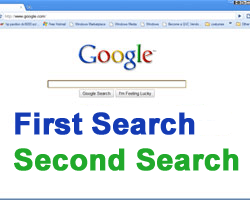
Let’s take a look at two types of website traffic that come from a Google search. I will call them “first-search” and “second-search” website traffic. Both are important, but most companies are too focused on one to even recognize the other. Their loss may be your gain!
Website Visitors Google What They Want!
I see a lot of companies scramble to be found in a Google search for what they sell, without enough consideration for the real reasons people are searching. I wish I had a dollar for every time somebody told me “we are in Google” and they think that is what matters. They may even be well ranked in Google for their product or service, and still be missing a huge number of potential sales. This often happens because much of their website traffic is from second-search users (I will explain in a moment) and competitors searching to check out the competition. I don’t know about you, but in a lot of industries, the competition is not the best target customer. Now, that is not true for every industry, because other SEO and Internet marketers are good clients for me (SEOs see “How To Market SEO and Vertical Internet Marketing“). I actually want to be a great resource to my “competition”, but for most people wanting to improve website traffic, the competition is not their best target.
Improve Website Traffic Through First Search Not Second Search
What is this “first search” and “second search” thing that I am writing about? An important Internet marketing factor that a lot of people do not measure or understand is that many people who search for something perform multiple types of searches. I will just give two main categories to explain this. I will call them “first-search” and “second-search”.
First-Search Website Traffic: First-search traffic comes when people search for what they want. If their toe hurts, they may search for “big blister on toe” as a first search. It helps them get direction. They want to know what to do with that big blister, and maybe what caused it. They are researching. They are not quite sure yet just what they want or need, but they are trying to find their way. Once they know their way and learn the industry-popular terminology and can refine a search, then they will use a second-search approach to filter through the available solutions.
Second-Search Website Traffic: If you are a podiatrist (foot doctor), you may feel that it is just great that they can find you when they search for a podiatrist, but what if you caught them in the first search? Wouldn’t it be more likely that if they found you in the first-search category that they will see you as a greater authority when they discover you again in the second-search? Then, once they figure out they need a podiatrist you will be a more likely choice to help them. Doesn’t this seem like a great idea to be an authority in both searches? Of course that makes sense, but do you think you are accomplishing the task? For most people, the answer is no. This includes your competitors.
Increased website traffic and better Google rankings are not the only things that matter. I could go into the topics of search conversion (getting more people to click on your website once they find you in Google listings) and website conversion (getting more people to take action once they are on your website). Those are both great topics for other articles, but what I want you to think about here is how to improve website traffic by answering people’s problems. In order to solve their problem, you will have to look at the core of your business. What do you do? I don’t mean looking at it as “practicing podiatry” but rather “we help people with sore toes who want something to help toe pain.”
As you notice the heading of this page states, “Google Website Marketing: How to Improve Website Traffic” and that is what I am here to tell you. “Google website marketing” is my example of first-search traffic, and it reaches my equivalent of a person with a sore toe. Once they learn more about my industry-specific terminology, they refine their search to compare solutions. For example, “reasons to blog” or “compare SEO” may be second-search considerations, because now they have a better feel for what they need.
Improve Website Traffic by Knowing Your Return Visitors
There is often a huge disparity between what a company hopes people will search for and what actually creates more business. I find that for many companies, even when they know what people search for, they often only mimic the competition by targeting the second-search users. They know that these second-search users become customers, but often ignore whether they are actually returning visitors who found them previously. Any business should target people who search for their product … the actual things that they sell. It just makes sense. What is too commonly missed is the website visitors who are actually returning first-search users, or otherwise knowing where they have been before they came to you. They may have been highly influenced long before the search term that you recognize as important. Imagine the value in knowing what they looked for the first time and honing in on those search terms. All of this is measurable, but many people just overlook the importance.
If you analyze your web server logs, your Google analytics, or other website analytics tool to find what people search for when they find your website for the first time and match it with the returning traffic, it may surprise you. Sometimes a better target is to reach people searching for the solution to a problem. Then, if you do not make them a customer in the first-search, you can be there for the second-search when they want to compare you to the competition. Analyzing your website traffic logs and giving close attention to returning website visitors can tell you a lot about what drives people to buy from you. If you are not paying attention and taking appropriate actions, you will miss a whole lot of customers.
A Real-Life First-Search and Second-Search Example
Many people find my websites for things like “compare SEO“, “lateral keywords“, “h1 tags“, and “Google SEO Starter Guide“. I rank nicely in searches for the things I do. However, I often find that some of my best clients came from first searches that were less industry-oriented, but then returned to my website as a result of a much more sophisticated search that shows they have done their homework. Reaching these readers in the first-search phase and repeatedly being there through their learning process is invaluable to me. Monitoring for these trends is important.
Maybe you rank nicely for your industry terms, too, but it is sometimes not the things that you do or sell that your best buyers will initially find you for in a Google search. If you improve your first-search exposure, you may find it a lot easier to reach the second-search buyers.
So, what do you think?


